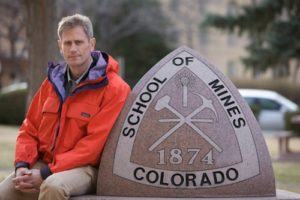
Date: March 15, 2018
Time: 12:30 p.m. - 1:30 p.m.
Location: Maeder Hall
Professor Matthew Posewitz, of the Colorado School of Mines, will speak on “Photosynthetic and Metabolic Networks in Salt-Water Photoautotrophic Microorganisms for the Production of Sustainable Biocommodities” as part of the 2017/2018 Highlight Seminar Series at the Andlinger Center for Energy and the Environment at Princeton University.
ABSTRACT
Many microalgae and cyanobacteria are able to thrive at seawater salinity and above. As an expanding human population continues to encounter resource limitations, these photosynthetic organisms grown in salt water may play an expanding role in food security, renewable energy and new biocommodities. Our recent research efforts have focused on isolating the fastest growing and most robust salt-water strains, and then developing genetic tools for further improvements. Specifically, we are focused on manipulating photosynthetic and biosynthetic pathways leading to starch, triacylglycerols, medium-chain fatty acids, nutraceuticals, a suite of terpenoids, or H2 in photosynthetic microorganisms. We demonstrate that manipulation of starch biosynthetic genes in green algae increases starch accumulation at the expense of protein synthesis and cell division in nutrient replete media where starch accumulation is relatively limited. Introduction of C10 and C15 terpenoid synthases was successfully achieved in the cyanobacterium Synechococcus sp. PCC 7002 to produce, and in most cases secrete, b-caryophyllene, a significant component of the oleoresin found in the “diesel tree” (Copaifera officinalis), limonene and bisabolene. We have also used thioesterase gene expression in the diatom Phaeodactylum tricornutum and Synechococcus sp. PCC 7002 to synthesize medium-chain fatty acids, which are secreted from Synechococcus sp. PCC 7002, or accumulate in the triacylglycerols of P. tricornutum. Glycogen and starch synthesis has been knocked out in cyanobacteria and algae, respectively to increase metabolic substrates for lipid accumulation. In starchless mutants, we observe modest increases in total fatty acid content, but significant increases in internal metabolites that are not being effectively captured for fatty acid synthesis. In sum, additional metabolic engineering efforts are required to fully capitalize on our current “push/pull” strategies. Lastly, we are developing synthetic biology tools for high-light, temperature, and salt tolerant strains that are fast growing as these are the most promising organisms for domestication. Genomic insights and next generation modifications to improve productivities will be presented.
BIO
Matthew Posewitz is the Rowlinson Professor of Chemistry at the Colorado School of Mines. He received his Ph.D. from Dartmouth College in bioinorganic chemistry in 1995. After doing postdoctoral research at the University of Utah and at the Memorial Sloan Kettering Cancer Center in New York City, he began investigating photosynthesis, algal metabolism and renewable commodity technologies at the National Renewable Energy Laboratory (NREL) in 2000. After three years at NREL, Professor Posewitz accepted a tenure track faculty position at Mines where his group’s research is focused on i) “domestication” of salt-water algae, ii) fundamental studies on electron transfer processes in photoautotrophic organisms and iii) metabolic engineering in algae and cyanobacteria.
The 2017/2018 Highlight Seminars Series will be held on Thursdays from 12:30 p.m. – 1:30 p.m. in Maeder Hall at the Andlinger Center. Lunch will be served at 12:00 noon in the auditorium lobby of Maeder Hall.